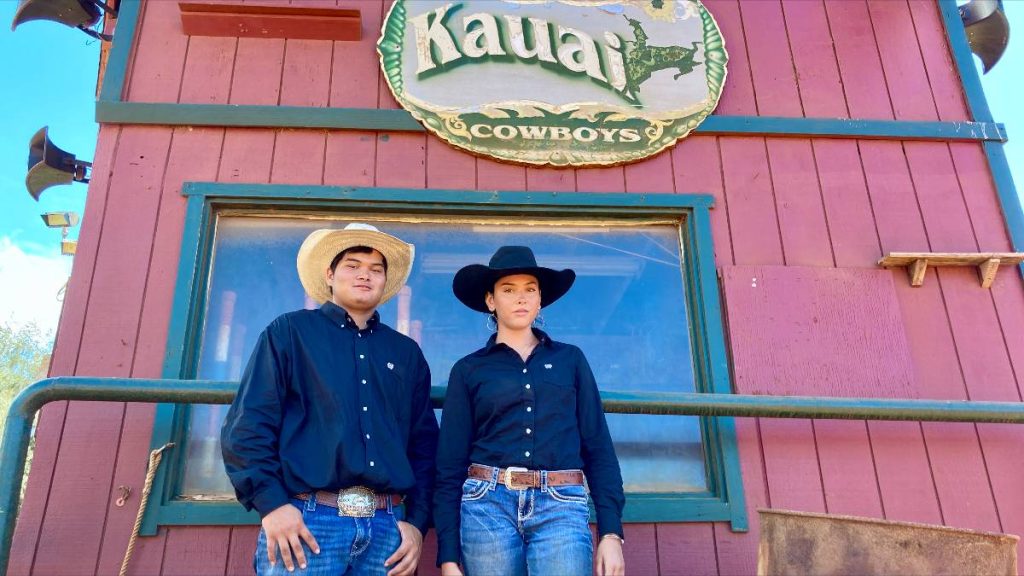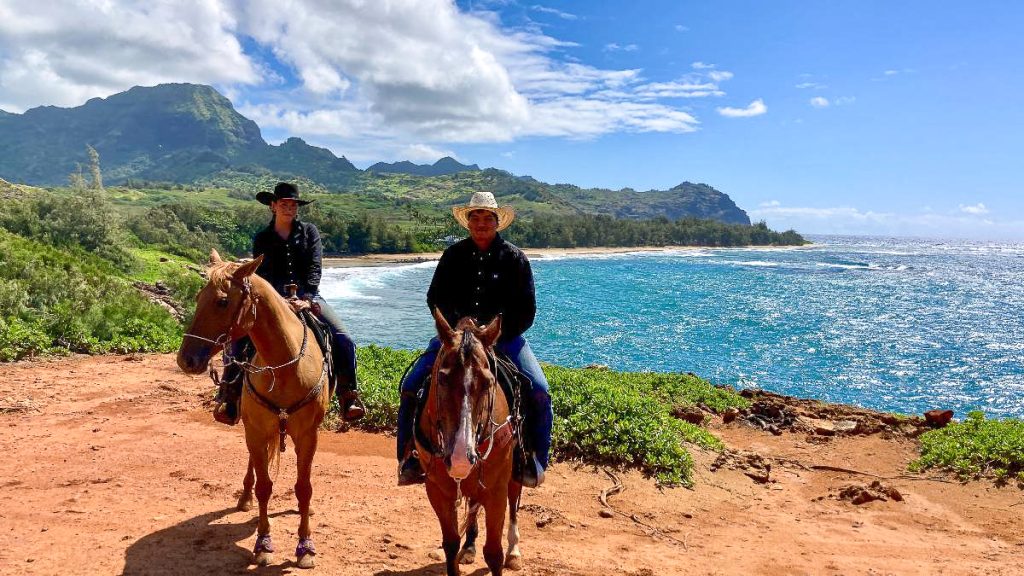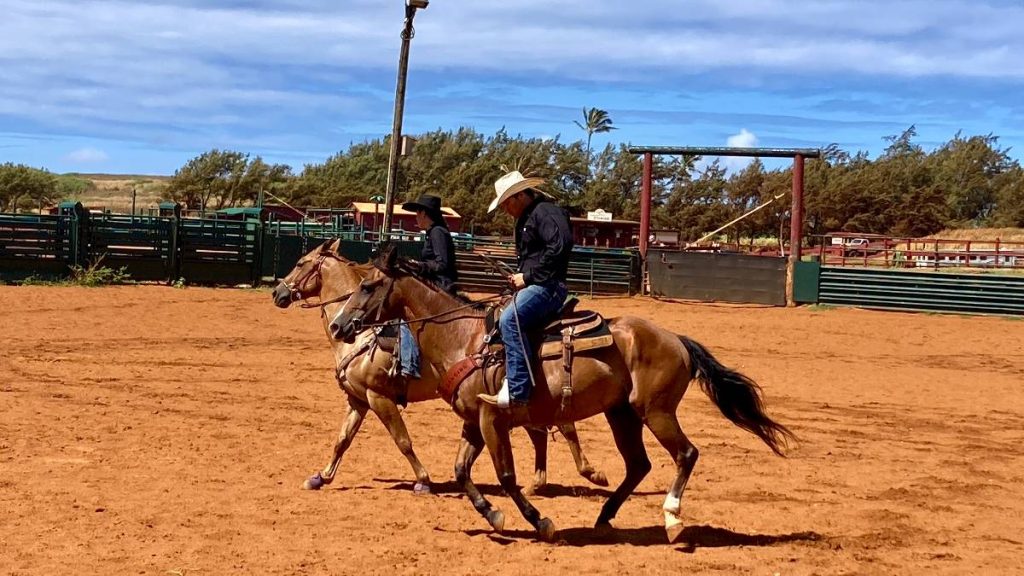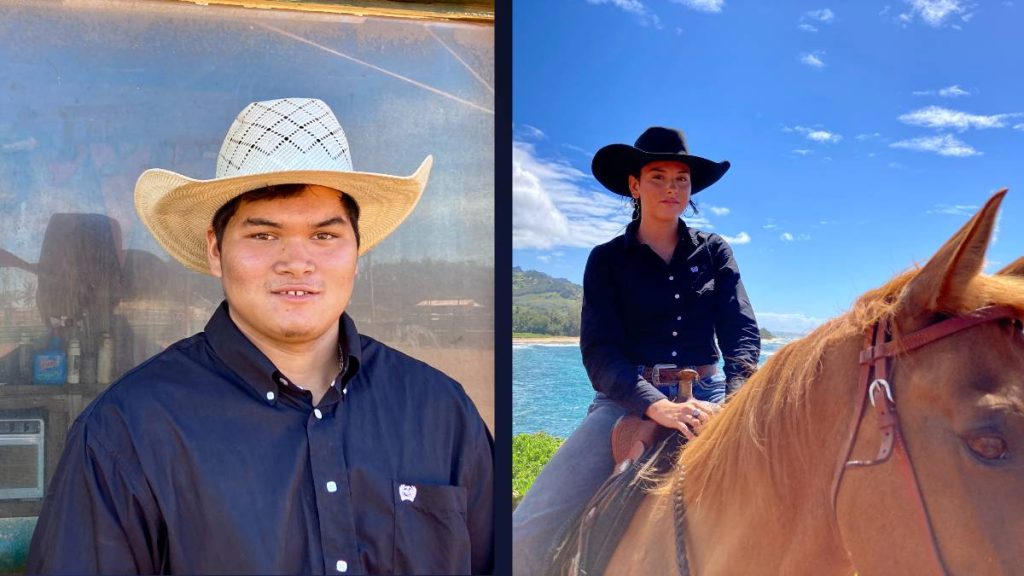Kaua‘i sending two young riders to world’s largest rodeo in Wyoming

Clad in black shirts, blue jeans and cowboy hats, Kiana Mertz and Kahanu Blackstad galloped around the arena at CJM Country Stables on the South Shore of Kauaʻi, their horses kicking red earth into the clear Hawaiian sky.
The 16-year-old paniolo (cowboys) are preparing for the world’s largest rodeo: the National High School Rodeo Association team finals.
They will travel next week to Gillette, Wyo., the site of the prestigious competition that runs July 17-24 and is celebrating its 75th anniversary.
Blackstad and Mertz will be joined by 27 other Hawai‘i teenagers who’ve qualified, but they are the only two from the Garden Isle.
“I’m super excited … I’ve heard really good things about Nationals,” Mertz said.
Mertz and Blackstad qualified several weeks ago, at a state event on O‘ahu.
The event is massive with more than 1,800 teenage cowboys and cowgirls — hailing from throughout the United States, Canada, Mexico, Australia and New Zealand — competing to become one of 19 world champions.
Blackstad and Mertz compete in different categories.
Blackstad will perform “cutting,” in which a rider and their horse work to separate a steer from a herd of cattle. He is confident in his physicality, but thinks his mental game needs work.
“I need to perfect some of the small things that will make a difference in my performance,” he explained. “Being stronger in my mind, being more focused and more calm, instead of being very nervous.”
Mertz will race in the pole-bending category, in which a rider weaves a horse between several poles set at a distance. The rider with the fastest time wins.
Kim Mertz said she is confident in her daughter’s ability: “This year she taught her horse Forrest pole bending. He caught on quick and so did Kiana. In one year of competing in pole bending, she made it to Nationals … I am so proud of Kiana. When she sets her mind to something, she makes it happen.”

But Blackstad and Mertz will have to compete on unfamiliar horses. It is too expensive to ship their familiar mounts Lucky and Forrest, so they will have to lease horses in Wyoming. They will have little time to practice with them.
Even with leased horses, it still costs about $10,000 each to compete. Expenses also include air travel, lodging and golf carts to navigate the rodeo’s enormous campground, where they will stay for one week.

Mertz and Blackstad were thrown together several weeks ago, when their qualification for the National High School Rodeo Association team finals was announced. They come from opposite ends of the Garden Isle, and from two very different riding traditions.
Blackstad has been riding since he was a baby. He comes from a family that have been ranchers for generations, and currently maintain a herd of 30 to 40 cattle. He now attends Hawai‘i Technology Academy and lives in Lāwaʻi on the South Shore of Kaua‘i.
Mertz comes from a family of surfers, and this year placed second at the annual Pine Trees Longboard Classic. She is from the North Shore town of Princeville and is a student at Kapa‘a High School.
Mertz’s interest in horsemanship didn’t begin until 2018, when she was 11 years old. For one year, she logged nearly 40 hours a week volunteering at Princeville Ranch.
“I thought she’d realize all the hard work that goes into horses and get over it, but no, she came home with dirt from head to toe and a huge smile. She was hooked,” her mother said.
Blackstad has aways enjoyed being around horses, which he said is “fascinating and fun. As we got older, we were always around it, so I went full force into it.”
He added: “Seeing that bond with your horse, seeing how well you connect with them and how well you can perform [makes the sport interesting].”

Gary Hawkes, the rodeo association’s marketing director, compared the event to Disney’s Epcot: one place representing cultures from throughout the world.
“One night can have a Louisiana crawfish boil, and Hawai‘i always brings amazing cooks as well,” Hawkes said. “You’ll get all these different cultures that blend together in the campground.”
The National High School Rodeo Association awards $1.9 million in scholarships each year. It will distribute $300,000 to scholarship applicants throughout team finals week. World champions also will receive awards.
Hawkes attributes the huge rodeo’s success to its family atmosphere.
“That’s the three things that people talk about with rodeo: it’s God, family and country,” he said.
He also said it’s a year-round sport.
“It’s not like football or something like that, where it can ebb and flow throughout different seasons,” he said. “This is all year round, because you’re caring for animals and you’re living the life that you love.”
Blackstad and Mertz are now fundraising as individuals to cover the cost of their trip. For more information, visit Mertz’s GoFundMe page here. Blackstad’s Venmo account is @waiblackstad. Mertz’s is @kianamertz.





